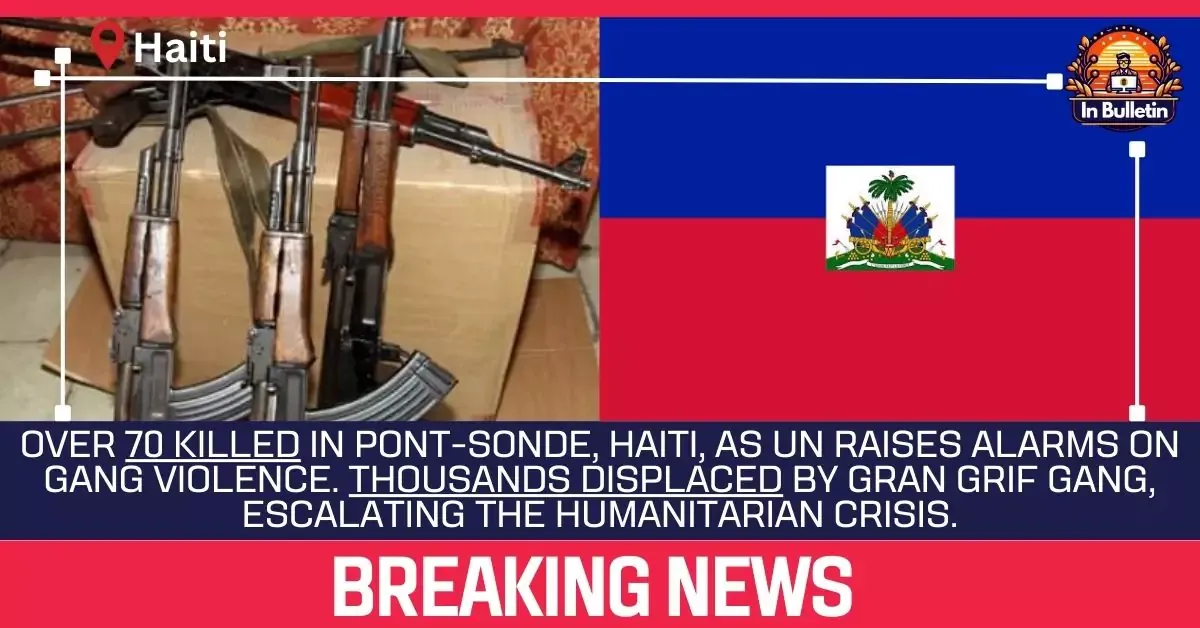Artibonite, Haiti (October 2024) – In the early hours of Thursday morning, tragedy struck the agricultural town of Pont-Sonde in Haiti’s Artibonite region, as gang members armed with automatic rifles stormed the community, killing at least 70 civilians. The attackers, members of the notorious "Gran Grif" gang, set fire to homes and vehicles, forcing over 6,000 residents to flee, according to the United Nations Human Rights Office.
A Devastating Attack
The assault began around 3 a.m. and lasted several hours. Witnesses describe scenes of chaos as terrified residents rushed from their homes, only to be gunned down by gang members. Entire families were wiped out, including three infants, making this one of the deadliest massacres in recent Haitian history.
The gang's leader, Luckson Elan, later took responsibility for the attack, claiming it was retaliation for what he called civilian inaction while vigilante groups and police forces killed his gang members. Elan and his group have terrorized the Artibonite region for years with kidnappings, murders, and extortion schemes.
The Aftermath: Thousands Displaced
The violence displaced over 6,000 people, many of whom fled to neighboring towns like Saint-Marc. Makeshift camps now house hundreds of survivors, and local hospitals are struggling to treat the dozens of seriously injured victims. The U.N.'s migration agency confirmed that 45 homes and 34 vehicles were set ablaze, adding to the widespread destruction.
“This odious crime against defenseless women, men, and children is not only an attack against victims but against the entire Haitian nation”, said Haitian Prime Minister Garry Conille on X (formerly Twitter). Local law enforcement and international peacekeeping forces have since been deployed to contain the situation.
Haiti's Escalating Gang Crisis
The massacre in Pont-Sonde is a reflection of the broader crisis engulfing Haiti. Armed gangs, controlling much of the capital, Port-au-Prince, are increasingly expanding their operations into rural areas. The Artibonite region, known as Haiti’s "breadbasket" for its agricultural output, has become a hotbed of gang activity, leading to food shortages and skyrocketing prices.
With nearly 700,000 people internally displaced due to gang violence, Haiti's security forces remain overwhelmed. Despite international promises of support, the country has received only a fraction of the resources needed to combat the escalating crisis. A U.N.-backed mission involving Kenyan peacekeepers has deployed around 400 officers but lacks the manpower to secure the vast affected regions.
International Response & Calls for Action
International organizations and human rights groups have condemned the attack, calling for immediate action to strengthen Haiti's security forces and protect civilians. "This violence disrupts the daily lives of residents, limiting their access to basic services, particularly health care," said the Haitian Ministry of Health in a statement.
The U.N. has reiterated its call for more international financial and logistical support, warning of dire humanitarian consequences if aid continues to be blocked by gangs. The U.S. Treasury Department recently imposed sanctions on Luckson Elan, accusing him of severe human rights abuses, including rape, kidnapping, and murder.
The Road Ahead for Haiti
As the nation mourns the loss of innocent lives, the path forward remains uncertain. The massacre in Pont-Sonde highlights the growing need for a coordinated, international response to restore law and order in the region. With food insecurity and homelessness rising, Haiti stands on the brink of a deeper humanitarian crisis.
The Haitian government, with limited resources, continues to push for urgent international intervention. But as violence spills from the capital into the rural heart of the country, the question remains: Will Haiti receive the support it desperately needs before it's too late?
Stay tuned with "In Bulletin", for more futher detailed updates on this incident & International Breaking News.




